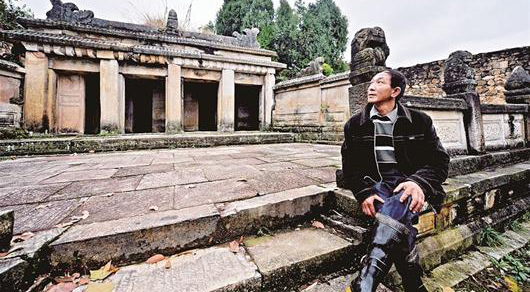Scholars offer advice on future Tusi studies

Tusi tombs at the Tangya Site in Xianfeng County, Hubei Province
Following UNESCO’s addition of the Tusi relics to its World Heritage List on July 4, Chinese scholars examined the status quo of Tusi studies and provided suggestions for further research in the field.
Shooting to fame as China’s 48th World Heritage Site, the Tusi regions include the Laosicheng Site in Yongshun County, Hunan Province; the Tangya Site in Xianfeng County, Hubei Province, and the Hailongtun Site in Zunyi City, Guizhou Province. Tusi refers to the tribal chieftains appointed by the central government to govern non-Han ethnic groups in southwest China from the 13th century to the early 20th century.
“Southwest China was inhabited by ethnic groups with diverse cultures and unbalanced development. They had complicated relations with the central government. The Tusi chieftain system provided a good means for regional societies to pursue development in times of stability and attain greater stability in times of development,” said Li Shiyu, chief expert of a national-level Tusi project and a research fellow from the Institute of History at the Chinese Academy of Social Sciences, adding that the Tusi system is reflective of the ideas “adjusting measures to local conditions” and “governing by custom.”
“The three Tusi regions have set an example for further studies of the system,” said Fang Tie, a professor from the Center for Studies of Chinese Southwest’s Borderland Ethnic Minorities at Yunnan University.
There are more than 100 Tusi sites across China, indicating huge room for excavation and research. Nonetheless, it is inadvisable to focus only on tangible Tusi relics, Fang said, calling for more efforts to probe Tusi institutions and cultures.
Scholars reached a consensus on the importance of institutional research in deepening Tusi studies. “Institutional research is fundamental to all studies. Otherwise it will be difficult to dig deeper into other aspects,” Li Shiyu said.
While acknowledging bourgeoning developments in Tusi studies, scholars also expressed concern about some undesirable practices, such as glorifying the Tusi system and mechanically applying Western theories to interpretation.
Li Liangpin, a professor from Yangtze Normal University, suggested scrutinizing localization of the national system in Tusi regions from the perspective of state governance to refute the fallacy of Western theories about Tusi studies.
Mao Li is a reporter at the Chinese Social Sciences Today.
